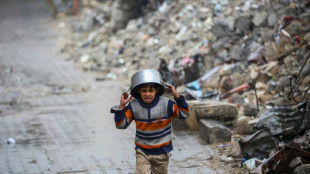
-
 No regrets: Merkel looks back at refugee crisis, Russia ties
No regrets: Merkel looks back at refugee crisis, Russia ties
-
IPL history-maker, 13, who 'came on Earth to play cricket'

-
 Ukraine says Russia using landmines to carry out 'genocidal activities'
Ukraine says Russia using landmines to carry out 'genocidal activities'
-
Prosecutors seek up to 12-year terms for French rape trial defendants

-
 'Record' drone barrage pummels Ukraine as missile tensions seethe
'Record' drone barrage pummels Ukraine as missile tensions seethe
-
Laos hostel staff detained after backpackers' deaths

-
 Hong Kong LGBTQ advocate wins posthumous legal victory
Hong Kong LGBTQ advocate wins posthumous legal victory
-
Ukraine says cannot meet landmine destruction pledge due to Russia invasion

-
 Rod Stewart to play Glastonbury legends slot
Rod Stewart to play Glastonbury legends slot
-
Winter rains pile misery on war-torn Gaza's displaced

-
 'Taiwan also has baseball': jubilant fans celebrate historic win
'Taiwan also has baseball': jubilant fans celebrate historic win
-
Russia pummels Ukraine with 'record' drone barrage

-
 Paul Pogba blackmail trial set to open in Paris
Paul Pogba blackmail trial set to open in Paris
-
China's Huawei unveils 'milestone' smartphone with homegrown OS

-
 Landmine victims gather to protest US decision to supply Ukraine
Landmine victims gather to protest US decision to supply Ukraine
-
Indian rival royal factions clash outside palace

-
 Equity markets retreat, dollar gains as Trump fires tariff warning
Equity markets retreat, dollar gains as Trump fires tariff warning
-
Manga adaptation 'Drops of God' nets International Emmy Award

-
 China's Huawei launches 'milestone' smartphone with homegrown OS
China's Huawei launches 'milestone' smartphone with homegrown OS
-
Philippine VP denies assassination plot against Marcos

-
 Four Pakistan security forces killed as ex-PM Khan supporters flood capital
Four Pakistan security forces killed as ex-PM Khan supporters flood capital
-
Hong Kong's legal battles over LGBTQ rights: key dates

-
 US lawmakers warn Hong Kong becoming financial crime hub
US lawmakers warn Hong Kong becoming financial crime hub
-
Compressed natural gas vehicles gain slow momentum in Nigeria

-
 As Arctic climate warms, even Santa runs short of snow
As Arctic climate warms, even Santa runs short of snow
-
Plastic pollution talks: the key sticking points

-
 Indonesia rejects Apple's $100 million investment offer
Indonesia rejects Apple's $100 million investment offer
-
Pakistan police fire tear gas, rubber bullets at ex-PM Khan supporters

-
 Ronaldo double takes Al Nassr to brink of AFC Champions League last 16
Ronaldo double takes Al Nassr to brink of AFC Champions League last 16
-
Pakistan police fire tear gas, rubber bullets at pro-Khan supporters

-
 Hong Kong same-sex couples win housing, inheritance rights
Hong Kong same-sex couples win housing, inheritance rights
-
Indonesia digs out as flooding, landslide death toll hits 20

-
 Liverpool's old guard thriving despite uncertain futures
Liverpool's old guard thriving despite uncertain futures
-
Mbappe takes reins for Real Madrid in Liverpool clash

-
 As AI gets real, slow and steady wins the race
As AI gets real, slow and steady wins the race
-
China's Huawei to launch 'milestone' smartphone with homegrown OS

-
 Porzingis and Morant make triumphant NBA returns
Porzingis and Morant make triumphant NBA returns
-
Hong Kong top court affirms housing, inheritance rights for same-sex couples

-
 Philippines, China clashes trigger money-making disinformation
Philippines, China clashes trigger money-making disinformation
-
Most Asian markets drop, dollar gains as Trump fires tariff warning

-
 England 'not quivering' ahead of New Zealand Test challenge
England 'not quivering' ahead of New Zealand Test challenge
-
Bethell to bat at three on England Test debut against New Zealand

-
 Trump vows big tariffs on Mexico, Canada and China
Trump vows big tariffs on Mexico, Canada and China
-
New Zealand and England to play for Crowe-Thorpe Trophy

-
 Scheffler, Schauffele and McIlroy up for PGA Player of the Year
Scheffler, Schauffele and McIlroy up for PGA Player of the Year
-
Trump to face less internal pushback in new term: ex-commerce chief

-
 Extreme weather threatens Canada's hydropower future
Extreme weather threatens Canada's hydropower future
-
More than 34,000 register as candidates for Mexico judges' election

-
 Australia ban cycling's Richardson for life after UK defection
Australia ban cycling's Richardson for life after UK defection
-
Internal displacement in Africa triples in 15 years: monitor


British-Iranians release helped by nuclear talks, Ukraine: analysts
The deal to release British-Iranian detainees was given vital impetus by nuclear talks in Vienna and the West's evolving energy needs in the face of Russia's war in Ukraine, analysts said on Thursday.
Tehran's high-profile release of Nazanin Zaghari-Ratcliffe and Anoosheh Ashoori on Wednesday came as the UK paid nearly £400 million ($523 million, 474 million euros) to settle a debt dating back to the 1970s amid sign of a potential thaw in Iran's relations with the West.
At the same time, talks in Vienna to renew a 2015 pact with Iran to relieve sanctions in exchange for curbs on Tehran's nuclear programme "made this deal possible", said Ali Vaez, Iran analyst with the International Crisis Group.
"Without it, it was hard to imagine that, when Iran and the West are at daggers drawn, these kind of deals could take place," he told AFP.
"This was purely a bilateral problem between Iran and the UK... but (a deal) was only possible in the broader context of constructive engagement.
"In fact a lot of stars would have to align for an agreement like this to be executed."
The detainee-debt deal required regional cooperation, including with Oman where the UK debt payment is being held, and "there was a need for a US greenlight and there was a need for constructive engagement between Iran and the UK," Vaez said.
Allan Hassaniyan, from the University of Exeter's Institute of Arab and Islamic Studies, said the Shah-era debt paid by London will be particularly useful in sanctions-hit Iran.
Tehran is "quite desperate" to access funds, Hassaniyan told AFP.
"It's a matter of desperation but it's also a window for Iran to operate differently," he said.
Russia's invasion of Ukraine "has provided Iran with a new opportunity because the West is very desperate for access to new energy resources in the absence of Russia."
By releasing the two detainees, the Iranians are "sending a signal that they want to commit into this new international system".
- 'Pragmatic policy' -
Iran expert Seyed Ali Alavi from London's SOAS said the deal signifies a change in British strategy rather than from Iran, which has always simply wanted the debt repaid.
The UK government has said it could not repay the debt because of US-led sanctions, but Alavi said that when the first nuclear deal was signed in 2015, sanctions were removed and the UK government could then have legally repaid.
"This should have been sorted out ages ago... The moment Britain decided to pursue a pragmatic policy, then immediately we did see the result in this regard," he told AFP.
"The war in Ukraine, and the shock in the energy market might be a wake up call for us, in the UK and in the West, that there is a country called Iran that is very rich in terms of oil and gas," said Alavi.
The ICG's Vaez said that when, as now seems likely, a new nuclear deal is inked, "there will be a psychological impact on the oil market in anticipation of Iran's return".
"And when additional Iranian oil exports eventually hit the market, the prices will come down."
The irony is that while Iran has bigger gas reserves than Russia, it cannot export them as its gas fields are underdeveloped because of Western sanctions.
"I think this is one of the short-sighted Western policies towards Iran over the past two decades as a result of sanctions -- Europe deprived itself of an alternative to Russian gas," said Vaez.
L.Janezki--BTB
